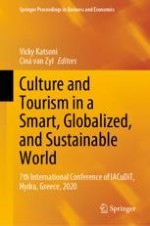2021 | OriginalPaper | Chapter
Exploring Scuba Diving Tourism Sector in Malta and Its Sustainable Impact on the Island
Authors : Simon Caruana, Tiffany Sultana
Published in: Culture and Tourism in a Smart, Globalized, and Sustainable World
Publisher: Springer International Publishing
Activate our intelligent search to find suitable subject content or patents.
Select sections of text to find matching patents with Artificial Intelligence. powered by
Select sections of text to find additional relevant content using AI-assisted search. powered by
